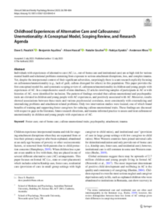Abstract:
Individuals with experiences of alternative care (AC; i.e., out-of-home care and institutional care) are at high risk for various mental health and relational problems stemming from exposure to serious attachment disruptions, loss, and complex trauma. Yet, despite the interpersonal context of their significant adversities, surprisingly there is scant research explicitly focusing on callousness/unemotionality (e.g., lack of guilt, callous disregard for others) in this population.
This paper provides the first conceptual model for, and systematic scoping review of, callousness/unemotionality in children and young people with experiences of AC. In a comprehensive search of nine databases, 22 articles involving samples of participants in AC or with histories of AC, were identified for inclusion. The pattern of findings revealed that callous-unemotional and psychopathic traits are elevated in children and young people with AC experiences, and positively associated with AC. Moreover, results showed associations between these traits and various psychosocial correlates, most consistently with externalizing and internalizing problems and attachment-related problems. Only two intervention studies were located, one of which found benefits of training and supporting foster caregivers for reducing callous-unemotional traits.
These findings are discussed with respect to gaps in the literature, future research directions, and trauma-informed practice to assess and treat callousness/unemotionality in children and young people with experiences of AC.

